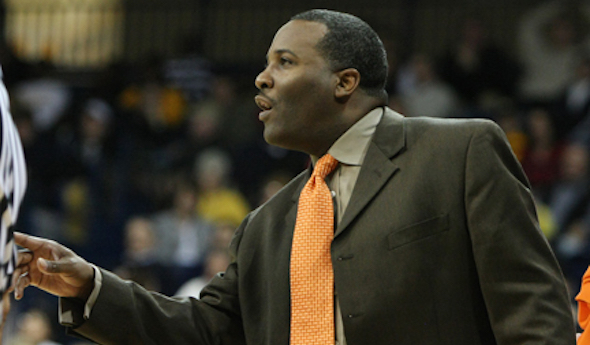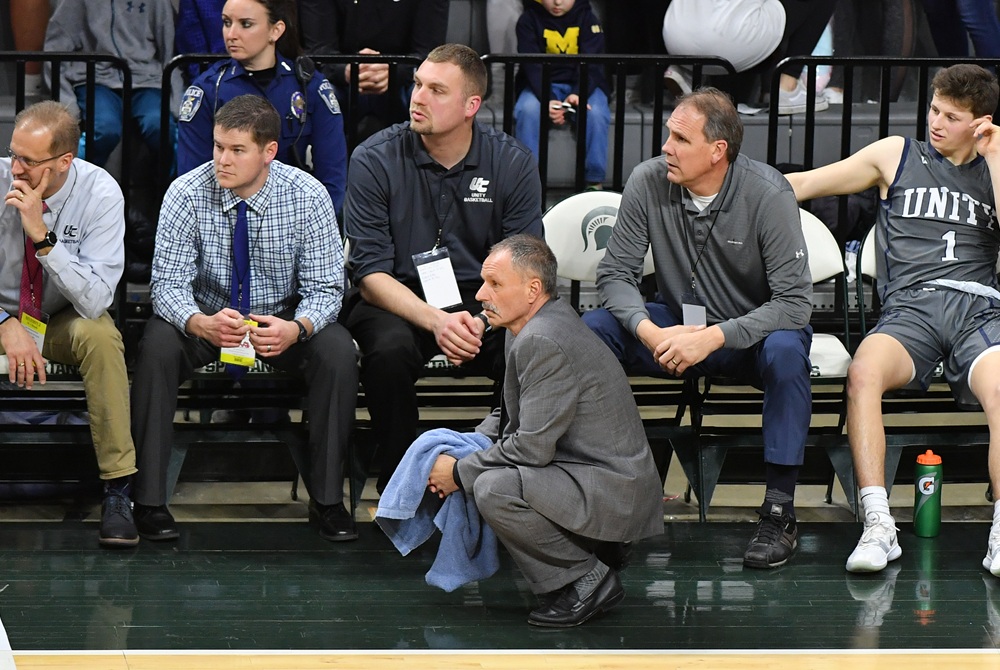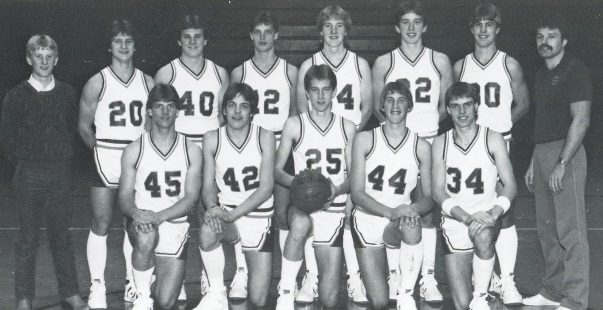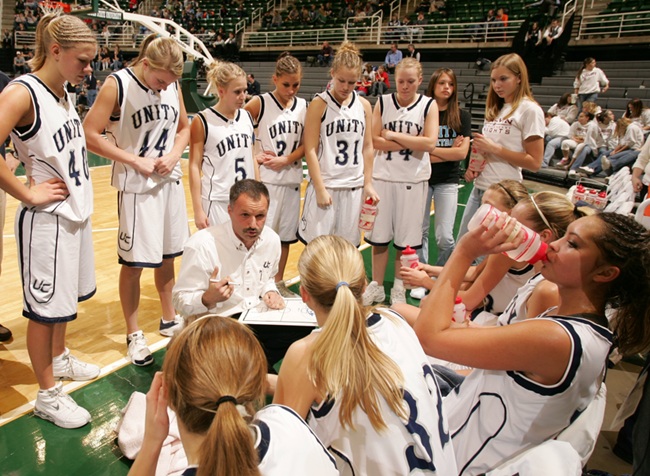
Coaches Return With College Knowledge
By
Tom Markowski
Special for Second Half
February 24, 2016
North Farmington boys basketball coach Todd Negoshian is not so vain to believe he’s at the top of his profession.
 After all, he’s nearing just his fifth season running what is considered one of the top programs in the Oakland Activities Association.
After all, he’s nearing just his fifth season running what is considered one of the top programs in the Oakland Activities Association.
What Negoshian is certain of is that he is a better coach now than he was during the early 2000s when he entered the profession as an assistant at North Farmington under his father, Tom Negoshian.
In addition to Todd Negoshian’s years as a high school coach, he spent three seasons (2004-07) as an assistant coach at Oakland University under coach Greg Kampe. Having worked at the college level has not only added to his knowledge as a coach but also given him an opportunity to work with different people under different circumstances but with similar goals.
“I learned a lot from Kampe,” Negoshian said. “I learned a lot about relationships. He has the uncanny ability to (scold) a kid and then 30 seconds later have your arms around him. It’s about building relationships.
“It’s his approach to coaching. There’s so many things you learned outside of coaching.”
This brief stint at the collegiate level gave Negoshian, 35, a whole new perspective on how to coach and how to be a coach. Building relationships takes time, and to those committed to being a coach who cares about his or her players, it’s paramount to allow for that time.
Some coaches, like John Beilein at University of Michigan, start out coaching at the high school level, move on to college and remain there. A number of others statewide have taken paths similar to that of Negoshian.
LaMonta Stone at River Rouge and Steve Hall at Detroit Cass Tech started coaching at the high school level and have recently returned to their roots after each spent several years as a college coach.
Stone played for the legendary Lofton Greene at River Rouge and then coached the Panthers to a Class B title in 1999. Stone ambitiously sought a position at the next level and was quite successful. He spent two seasons at Eastern Michigan, two at Ohio State and 10 at Bowling Green before returning to River Rouge last season as head coach.
And he has no regrets.
“At that point, I had goals,” Stone said of making the jump to college. “There were things I wanted to do. I still have goals. People ask me, would I go back to college? I don’t know. If the situation was right, I might.”
Stone, 49, returned for two reasons: family and community. Last season he was able to coach his oldest son, LaMonta, Jr., his senior year. Stone also has two other sons, ages 6 and 9.
 Basketball is king in River Rouge. Greene won a record 12 MHSAA titles and the program has won two more since his departure. But the Panthers relinquished their claim as a state power soon after Stone left and haven’t been much of a factor in the tournament since. Stone intends on changing that.
Basketball is king in River Rouge. Greene won a record 12 MHSAA titles and the program has won two more since his departure. But the Panthers relinquished their claim as a state power soon after Stone left and haven’t been much of a factor in the tournament since. Stone intends on changing that.
“It’s a situation where, I’d been (coaching in college) for 14 years,” he said. “I’d reached all my goals. The only one I didn’t was to become a head coach. But you’re an assistant in the Big Ten. You can’t get much higher than that.
“The opportunity to come back to that community, I just couldn’t pass up. I get to be more of a part of my sons’ lives.”
In addition to the high school season, Stone said he enjoys coaching during the summer, in camps and individually.
“I can, within the (Michigan High School Athletic Association) rules, work with kids outside of Rouge,” he said. “I get calls all the time saying can you work with my son. I work with them but they can’t come to Rouge. I like it that way. There’s no pressure on me or them.”
Hall, 45, was one of the state’s top players when he graduated from Cass Tech in 1988. He played four years in college (Washington, Virginia Tech) before playing professionally overseas. In 1996 he became the head coach at Detroit Rogers, an all-boys school in the Detroit Public School League. Hall spent nine seasons there and won three MHSAA titles before the school closed.
Hall went to Detroit Northwestern in 2005 and spent three seasons there, winning one PSL title, before accepting a position as an assistant coach at Duquesne University in Pittsburgh. He spent four seasons there before becoming an assistant coach at Youngstown State. On Aug. 25, Hall officially came back to Detroit as athletic director and boys basketball coach at Cass Tech.
Like Stone, Hall was looking for a more stable lifestyle. Family came first, and the opportunity to coach his alma mater was too good to pass up.
“A lot had to do with my life at this stage,” he said. “I have two young boys (ages 7 and 4) and to be more a part of their lives is important. If I wanted to spend time with them, we’d go to a game where I was recruiting a kid and that would be our time together on that given day.
“And I have a passion for this school. This whole year has been learning on the fly. At Rogers there was a lack of numbers. Here football is huge. We didn’t have a football team at Rogers. And here I have a surplus of numbers. It’s a different dynamic. Rogers was the smallest school in the PSL by enrollment. Cass is the biggest.”
Hall said he doesn’t miss the hours of travelling on the road, going into countless gymnasiums recruiting players and trying to convince them and their coaches that his university was the right one. It’s not that his responsibilities as athletic director and coach are less demanding. But being able to go home every night and see his children and sleep in his bed has its rewards.
Hall said he had more than a few conversations with Stone on returning home.
All three coaches agree that experience has its benefits. It’s not that coaching is any easier at this time. The challenges are still there and in many ways demand different approaches.
“Every stop makes you better,” Negoshian said. “Anytime you coach kids, the more you are around them, it helps.
“The game has changed. Society changed. Kids don’t want to fight through tough times. That’s why you see so many transfers. Everybody wants to be the hero. They want the focus on them. And it’s just not them. It’s the family. I’m not sure all of the parents are committed. They don’t want to go to A, B and C to get to D.”
Hall said the expectations for incoming freshmen and their parents are so different than it was when he was in high school. Then students went to a certain school, whether it was a power like Detroit Southwestern or a neighborhood school like Detroit Mumford, to be a part of an established program.
“It’s a trickle down from college,” Hall said. “It’s not, ‘I want to send my kid to a great program.’ There’s the attitude that if my son isn’t a part of it as a freshman, I’ll go somewhere else instead of being part of the process.”
 Tom Markowski is a columnist and directs website coverage for the State Champs! Sports Network. He previously covered primarily high school sports for the The Detroit News from 1984-2014, focusing on the Detroit area and contributing to statewide coverage of football and basketball. Contact him at [email protected] with story ideas for Oakland, Macomb and Wayne counties.
Tom Markowski is a columnist and directs website coverage for the State Champs! Sports Network. He previously covered primarily high school sports for the The Detroit News from 1984-2014, focusing on the Detroit area and contributing to statewide coverage of football and basketball. Contact him at [email protected] with story ideas for Oakland, Macomb and Wayne counties.
PHOTOS: (Top) Current River Rouge boys basketball coach LaMonta Stone returned to his alma mater after serving as a college assistant including at Bowling Green. (Middle) Todd Negoshian, LaMonta Stone, Steve Hall. (Top photo courtesy of LaMonta Stone.)

Soodsma Reaches 700 Boys Hoops Coaching Wins as Unity Launches Another Title Pursuit
By
Dean Holzwarth
Special for MHSAA.com
February 26, 2026
HUDSONVILLE – Hudsonville Unity Christian boys basketball coach Scott Soodsma has been a fixture on the sidelines for more than 40 years.
 And while he’s known as a man of faith, a fierce competitor and a coach who pours everything he has into his players, he’s most commonly known as the coach with the blue towel.
And while he’s known as a man of faith, a fierce competitor and a coach who pours everything he has into his players, he’s most commonly known as the coach with the blue towel.
“I’ve had the same blue towel for 34 years at Unity, and it’s had holes in it and been sewed up a few times,” the 66-year-old Soodsma said. “It’s been around for a long time.”
The blue towel has been with Soodsma at every game, except for the first game this season against Grandville Calvin Christian.
“I had no idea where it was,” said Soodsma, who retired from teaching last year. “I stuck it in an old diaper bag and thought I would remember that I put it in there, but I didn’t. Luckily, my wife found it. I’ve never not had it except for that first game this year.”
The comfort of having a towel with him during games started during his first season (1983-84) at James Valley Christian, located in Huron, South Dakota.
It has been a lasting presence ever since, although the colors have changed.
“I had a pink towel when I coached girls at Unity, a yellow one at James Valley, and a maroon towel at McBain Northern Michigan Christian,” he said. “I don’t know, it’s just something I started having with me and I’ve had my wife run home from games when I've already been there and forgot it.
“I've sent her back home to get it because I didn’t want to coach without it. It’s been the thing I've been known for, for a long time.”
 Soodsma had it with him when he earned his 700th career win as a boys coach in a 69-28 victory over Zeeland West on Feb. 12.
Soodsma had it with him when he earned his 700th career win as a boys coach in a 69-28 victory over Zeeland West on Feb. 12.
He currently is fifth on the list of winningest coaches in MHSAA boys basketball history with a 688-258 record coaching at Northern Michigan Christian and Unity.
“It’s really amazing, and I've been very blessed to be able to go the length I have gone,” Soodsma said. “There were times when I thought I was done and I was dumb enough to do girls for five years at the same time and I did one season when the girls and boys were together.
“I’ve had a lot of texts and calls from kids after the 700 wins went out in the public and those are things that make it all worthwhile, to hear the comments and the thank-yous for what you did and the part you played in their life. More valuable than that, wanting to be part of their journey and their faith as well has been a big deciding factor in why I've stayed in it.”
Soodsma, who has won over 800 games combined as a boys and girls coach, led McBain Northern Michigan Christian to the Class D boys title in 1987. He won the Division 2 championship at Unity in 2019.
He also coached Unity’s girls to the Class B crown in 2006.
“I still love it,” he said. “I love the kids and I love the competition, but over the years, most people don't realize it, but I have mellowed a lot and I think I’m in it for the right reasons because I enjoy the kids. I want to be a factor in their life, not only from a basketball perspective, but from a Christian perspective and a faith perspective. It means a lot more to me now at my age than when I was 35-40. It’s not about wins and losses anymore.”
Unity Christian senior Kyler Berguis said Soodsma has had a profound impact on his life.
In my three years of having him as my coach I’ve never had someone motivate me more to accomplish a goal we both love so much, and that is winning,” he said. “He’s an amazing motivator, always pushing kids to be their very best every single time he steps on the court, whether that is in practice, games or shootarounds, it doesn't matter.
“You will never not feel the energy that Coach brings to the court, and the crazy thing is he’s been doing it forever. He not only has pushed me in basketball but most importantly he pushes the players off the court in how to be a man of God.”
Past Crusaders standout Gabe Newhof, currently a senior at Division I James Madison in Virginia, said Soodsma’s compassion for his players runs deep.
 “Coach has had an incredible impact on my development as a young man,” Newhof said. “Through the mountains and valleys of my life, he has been there for me. When I suffered an awful broken leg, he came and visited me at my house to let me know he cared.
“Coach has had an incredible impact on my development as a young man,” Newhof said. “Through the mountains and valleys of my life, he has been there for me. When I suffered an awful broken leg, he came and visited me at my house to let me know he cared.
“During my successes in college he has always been a voice of encouragement. I am so glad to have had a coach like him who truly cares about me on a much deeper level than just a player.”
Soodsma has guided this year’s squad to an Ottawa-Kent Conference Black title, which included going a perfect 12-0 in league play, and a 20-3 overall record after Wednesday night’s Division 2 District Semifinal win over host Wyoming Godwin Heights.
The Crusaders’ losses were to state-ranked Rockford, Hudsonville and Freeland. Unity hopes for a deep postseason run but has been hampered recently by sickness and without a couple of its top players.
“This has been a special group,” said Soodsma, who boasts seven seniors. “The one thing we pride ourselves on at Unity is getting better as the year progresses, and I could really see the kids stepping up.
“We knew we had some good kids coming back, but I didn’t think we were playing exceptionally well in December or early January. But in the middle of the month, I started to see some kids really take some huge strides in a lot of ways. The kids have done a great job of coming together as a team, and it’s definitely shown. We’ve been playing some of the best ball we have all year.”
Soodsma has been asked frequently over the past few years when he is going to step away from coaching and retire.
He said he takes each season one at a time, but as he gets older he doesn’t want to miss out on moments with his grandkids, who are scattered through the country.
“I evaluate after every year, and I will evaluate again after this season, but this could be it,” Soodsma said. “I always like to wait till the end of the season before I make any rash decisions.
“I have family all over the United States in Seattle, Denver and South Dakota, so I really want to spend some quality time with my grandkids before they get too old."
 Dean Holzwarth has covered primarily high school sports for Grand Rapids-based WOOD-TV for five years after serving at the Grand Rapids Press and MLive for 16 years along with shorter stints at the Ionia Sentinel and WZZM. Contact him at [email protected] with story ideas for Allegan, Kent and Ottawa counties.
Dean Holzwarth has covered primarily high school sports for Grand Rapids-based WOOD-TV for five years after serving at the Grand Rapids Press and MLive for 16 years along with shorter stints at the Ionia Sentinel and WZZM. Contact him at [email protected] with story ideas for Allegan, Kent and Ottawa counties.
PHOTOS (Top) Unity Christian boys basketball coach Scott Soodsma, kneeling, confers with his staff during his team’s 2019 Division 2 Boys Semifinal win over Ludington. (Middle) Soodsma, far right, stands for a photo with his 1987 Northern Michigan Christian Class D boys basketball champion. (Below) Soodsma maps out strategy during a break in the 2006 Division 2 Girls Basketball Final. (MHSAA file photos.)

